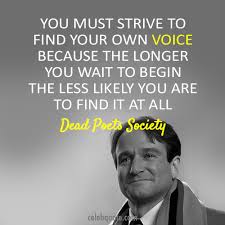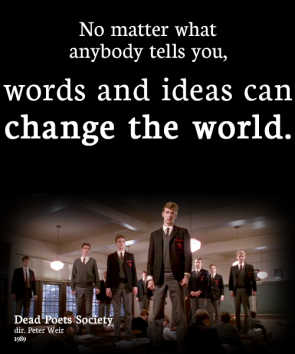Yesterday the world lost an incredibly talented comedian and actor. He was a man who saw me through my childhood, teens, twenties and beyond with an equal measure of thought-provoking moments and good humour. But it was no surprise to hear that the star of Dead Poets Society and Goodwill Hunting had also been battling severe depression.
I felt stunned by the news of the death of Robin Williams because he was part of the fabric of my childhood and teenage years, through what I watched and through what those films taught me about life. It was his remarkable ability to bring characters to life that has entertained millions of us through the years. And I believe that comedy and acting quite possibly provided the escape that he needed, an escape from the darkness of his own mind. Depression is a very hidden issue and it is often misunderstood. Scientists have been fascinated by the possibility of a link between depression and creativity for years. In this interesting article on the link between the two, we learn that Norwegian artist, Edvard Munch, wrote the following diary entry: “My fear of life is necessary to me, as is my illness. They are indistinguishable from me, and their destruction would destroy my art.”
Early studies found that creatives often suffered from depression: Charles Dickens, Tennessee Williams, Ernest Hemingway, Graham Greene, Hans Christian Andersen, Leo Tolstoy and Virginia Woolf. Sylvia Plath also sadly took her own life.
Why am I discussing this here? Because I believe that writers have an innate ability to tap into the pain of grief and loss; to take the experiences which they encounter, and to illustrate the difficulties of anxiety and pain. They are able to translate these emotions into the lives of their characters, allowing the reader to tap into their own difficulties and to rise above them.
I often hear people talking about finding solace in books. Some readers say that they find particular books healing. The talent of a creative who is able to paint, act, write or create music lies in their ability to mold their own suffering and angst into a form that is universally understood. Where it might be difficult and overwhelming to face certain situations head on art, books, film and music allow a release of emotions and allow people to reach into the painful aspects of life and engage with issues that can be difficult to discuss.
Writers and artists are often accused of being oversensitive or overly analytical, as though these traits might be weaknesses, but I would argue that this is exactly where their strength lies, and where their empathy and ability to connect with difficult emotions helps them to write a character with flaws, a character who experiences setbacks and difficulties. Interestingly, the body releases natural opiates as a result of the creative process. Harvard Professor, Shelley Carson, says that “creative endeavors are intrinsically rewarding, and you get shots of dopamine in the rewards center of the brain.”
What are your thoughts? Are you a writer with any experience of depression? Do you find find solace in reading or writing?


I feel for Sylvia and hope she can write about her friend and her loss. I simply had to say that we must remember that depression is a devastating illness not an emotion. I’ve lived with someone suffering with clinical depression for over thirty years. It’s a terrible and debilitating condition. I don’t think it necessarily has a great deal to do with sensitivity or that creativity is necessarily a bi-product, in the worst throes of depression, the opposite is more likely to be true. In my experience creativity requires a degree of optimism and sense of purpose. (I must add that although, like most people, I can be moody, fortunately I don’t suffer from depression)
LikeLike
And therein lies the uniqueness of each person. It is interesting that so many incredibly creative people suffer from depression but I agree that, at its worst, there is a total shutdown of output. I wish you well, Mand. It must be very difficult to support someone who is suffering.
LikeLike
Having lost a beloved friend on the eve of a recent writing conference, I have been unable to find any solace in writing or in reading. My priorities and perspectives have changed. It´s not about solace for me. It´s about getting outside of myself and my navel. The anger is wearing off. The disappointment, too. I will read and write again, no doubt. But not yet. Now, I just want to celebrate my beloved friend. And I want to celebrate the work of “My Captain”.
LikeLike
Sylvia, I’m so sorry for your loss. I can understand the difficulty of writing at the moment. Grief affects us all in different ways and I think extreme grief makes it really difficult to write. Thinking of you and hope you find peace and can celebrate his life quietly.
LikeLike